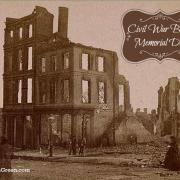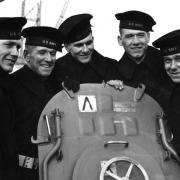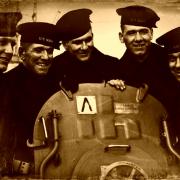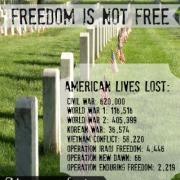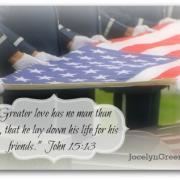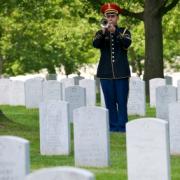A note from Jocelyn: Last summer, I visited Virginia's Peninsula to research my Civil War novel, Wedded to War. While there, I stayed with Linda Montgomery, the editor of ExcellentorPraiseworthy.org, the devotional Web site of Campus Crusade's Military Ministry. In honor of Memorial Day, I want to share with you an article by Linda about the origin and meaning of "Taps." It first appeared at ExcellentorPraiseworthy.org. July 2012 marks the 150th anniversary of Taps, as it was written after the Seven Days Battle (which appears in Wedded to War).
Where can I go from Your Spirit? Where can I flee from Your presence? If I go up to the heavens, You are there; if I make my bed in the depths, You are there. If I rise on the wings of the dawn, if I settle on the far side of the sea, even there Your hand will guide me, Your right hand will hold me fast. — Psalm 139:7-10
For me, the story of “Taps” is a local story because I live close to where it was composed. I could easily drive to Berkeley Plantation in Virginia, where there is a monument marking the “birthplace” of Taps. Tour guides will tell you that the haunting 24-note bugle call is actually a revision of a French call to signal to the troops the end of the day and “lights out.”
The story goes like this: “In of July of 1862, in the aftermath of the bloody Seven Days battles (Peninsular campaign), hard on the loss of 600 men and wounded himself, Union General Daniel Adams Butterfield called the brigade bugler to his tent. . . .Oliver Wilcox Norton, the bugler, tells the story, ‘. . . showing me some notes on a staff written in pencil on the back of an envelope (some accounts say that Butterfield hummed it to Norton), (he) asked me to sound them on my bugle. I did this several times, playing the music as written. He changed it somewhat, lengthening some notes and shortening others, but retaining the melody as he first gave it to me. After getting it to his satisfaction, he directed me to sound that call for Taps thereafter in place of the regulation call. The music was beautiful on that still summer night and was heard far beyond the limits of our Brigade. The next day I was visited by several buglers from neighboring Brigades, asking for copies of the music which I gladly furnished. The call was gradually taken up through the Army of the Potomac.’” From “History of Taps.”
Savage's Station, Virginia, June 30, 1862, Union field hospital during and after the Seven Days Battle. Photo courtesy: Library of Congress
Not long after Taps was composed, it was used for the first time at a military funeral. Union Captain John Tidball, commander of an artillery battery, had it played for the burial of a cannoneer killed in action (during the Peninsular Campaign) because the traditional three-rifle volleys fired over the grave might have alerted the enemy nearby. This event is commemorated in a stained glass window at The Chapel of the Centurion, also nearby at Ft. Monroe.
Ten months after it was written, Taps was played at the funeral of Confederate General “Stonewall” Jackson. By 1874 Taps was officially recognized by the U.S. Army and was required to be played at military funerals by 1891. Taps is played throughout our nation on Memorial Day as it is traditionally sounded at funerals, wreath-laying, and memorial services. In order to honor those who died in service to our country, giving the ultimate sacrifice—Taps is played in remembrance of all of those who have insured our precious freedom.
While we are hearing the strains perhaps you can also remember the words which are associated with the bugle call. While these lyrics are not “official,” the first verse is commonly sung with these words: “Day is done, gone the sun, From the hills, from the lake, From the sky. All is well, safely rest, God is nigh.”
God is nigh. The definition of “nigh” is “near in space, time, or relation.” The American College Dictionary, 1955. God is near:
You are near, O LORD, and all Your commandments are truth. — Psalm 119:151
The LORD is near to the brokenhearted and saves those who are crushed in spirit. — Psalm 34:18
But as for me, the nearness of God is my good; I have made the Lord GOD my refuge, that I may tell of all Your works. — Psalm 73:28
The LORD is near to all who call upon Him, to all who call upon Him in truth. — Psalm 145:18
Let your gentle spirit be known to all men. The Lord is near. — Philippians 4:5
The last verse of Taps, traditionally, is similar to the first verse: “Thanks and praise, For our days, ‘Neath the sun, ‘Neath the stars, ‘Neath the sky, As we go, This we know, God is nigh.”
Is there any doubt in your mind and heart that God is near, during deployment? Even during the lowly conditions of war in 1862, God was there.
Jari A. Villanueva is a bugler and bugle historian, considered the country’s foremost authority on Taps. He wrote: “.. . it is hard to believe that Butterfield could have composed anything that July in the aftermath of the Seven Days battles which saw the Union Army of the Potomac mangled by Lee’s Army of Northern Virgina. Over twenty six thousand casualties were suffered on both sides. . . . In the midst of the heat, humidity, mud, mosquitoes, dysentery, typhoid and general wretchedness of camp life in that early July, it is hard to imagine being able to write anything.” From “24 Notes that Tap Deep Emotions”.
But write it (or revise it) he did, and Butterfield’s desire to honor his soldiers is forever the way that we seek to honor our brave soldiers. The Scripture from Psalm 139 is a reminder of what we declare in the singing of Taps. With a lump in our throats and perhaps tears in our eyes, we remember this Memorial Day, with grateful hearts, those courageous patriots who have gone before us in battle. . . . and we remember that our God is faithful . . . . and near.
Questions to Share:
1. What thoughts come to your mind when you hear Taps?
2. On this Memorial Day, is there someone who served our country whom you could tell your spouse about as a way of honoring them?
Note: Additional information on Taps is available at www.tapsbugler.com

